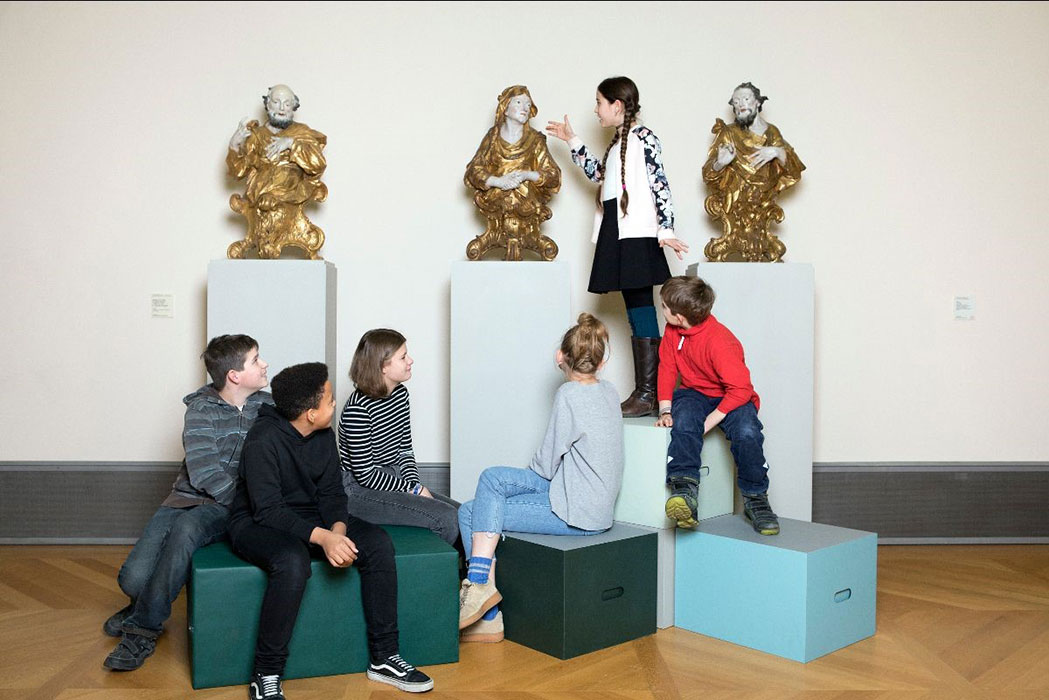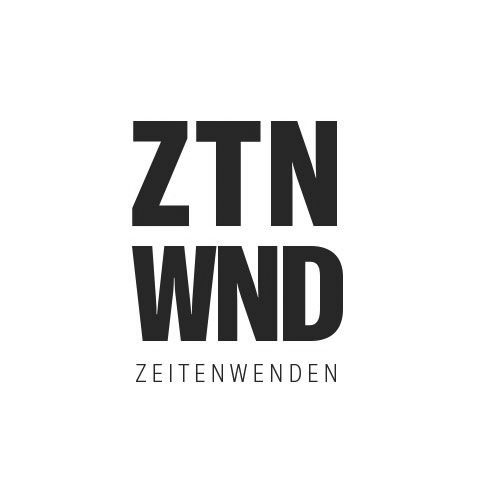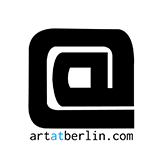The Federal Cultural Foundation and the National Museums in Berlin have launched the “lab.Bode-Initiative zur Stärkung der Vermittlungsarbeit in Museen” (lab.Bode-Initiative for Strengthening the Mediation Work in Museums) as an important signal for the expansion of modern and networked mediation work in museums.
Image above: lab.Bode – Initiative to strengthen the mediation work in museums. Photo Juliane Eirich, 2018
Since the summer of 2016, the Bode Museum has been a laboratory for researching and testing future-oriented educational concepts and integrating them into museum work. With the mediation laboratory, the school programme and a nationwide volunteer programme in a total of 23 museums, the aim is to show what mediation work can achieve in museums. In December 2018, the second group of 12 partner museums will start active cooperation with lab.Bode. Until 2020, the initiative will make successfully tested methods and results available to museums nationwide as a digital construction kit and all Berlin schools are invited to use the newly developed project days as a bookable offer free of charge. lab.Bode will be accompanied by a discourse programme with international experts that is unique in Germany.
Since 2016, 23 partner museums from all over Germany, 9 Berlin partner schools and numerous experts have been successfully involved in 28 school projects, 15 discourse events and three mini residencies as well as the development of an extensive further education programme in the lab.Bode mediation laboratory in the Bode Museum. In the Bode-Museum, pupils of various ages and backgrounds have studied the works of art in the collection, from Riemenschneider to Canova. Volunteers have been hospitating at the Bode-Museum and have implemented their own projects at their homes. The positive influences of lab.Bode can be felt not only in the Bode-Museum, but also in the partner museums, which set new impulses in their mediation work. The public discourse programme enjoys a high number of visitors and the popularity of the project days with Berlin schools also testifies to the successful implementation of the school programme.
Participating Museums
• Kunsthalle Bremen • Kunsthalle Mannheim • Kunstmuseum Stuttgart • Städtische Galerie im Lenbachhaus, München • Lindenau-Museum Altenburg • Museum für Gegenwartskunst Siegen • Museum Pfalzgalerie Kaiserslautern • Neues Museum – Staatliches Museum für Kunst und Design in Nürnberg • Staatliche Kunstsammlungen Dresden • Städtisches Museum Abteiberg, Mönchengladbach • Museum Ulm • Focke Museum, Bremer Landesmuseum für Kunst und Kulturgeschichte • GfZK – Galerie für Zeitgenössische Kunst Leipzig • Historisches Museum Frankfurt• Jüdisches Museum Frankfurt • Kunstmuseum Villa Zanders, Bergisch Gladbach • MEWO Kunsthalle, Memmingen • Klostermuseum Unser Lieben Frauen Magdeburg • Berlinische Galerie • Brücke-Museum, Berlin • Museum Folkwang, Essen • Landesmuseum Württemberg, Stuttgart • Museum Ludwig, Köln
Participating Berlin Schools
(2 Grundschulen, 2 Gemeinschaftsschulen, 2 integrierte Sekundarschulen, 3 Gymnasien) • Sophie-Brahe-Schule, Treptow-Köpenick • B. Traven Gemeinschaftsschule, Spandau • Athene-Grundschule, Steglitz-Zehlendorf • Grunewald-Grundschule, Charlottenburg-Wilmersdorf • Herder-Gymnasium, Charlottenburg-Wilmersdorf • Barnim-Gymnasium Berlin, Lichtenberg • Thomas-Mann-Gymnasium, Reinickendor f• Gustav-Langenscheidt-Schule, Tempelhof-Schöneberg • Schule am Rathaus, Lichtenberg
The Volunteer Program
Lab.Bode promotes scientific traineeships in the field of education and mediation at 23 partner museums throughout Germany. All volunteers take part in an advanced training programme, accompany school projects in the Bode Museum and develop their own formats in their museums. For example, the school project “WELCHE_R HELD_IN STECKT IN DIR?”, which a Bremen volunteer developed this year based on the project “GARDE DER SUPERHELD_INNEN” carried out in lab.Bode, and which is contributing to the mediation work of her museum, the Kunsthalle Bremen. Due to the positive response, the aim is to establish the advanced training programme as an offer for museums throughout Germany beyond the duration of the programme.
The School Programme
Nine Berlin partner schools have been working together with the Bode-Museum since 2016 and are each implementing one to two extensive cooperation projects per school year. In the school year 2017/2018 a total of 406 pupils visited the museum on 99 workshop days. Pupils and teachers conduct research by placing their own works alongside the sculptures in the museum’s collection or, for example, measuring the shoe size of the Elector’s equestrian statue in the large entrance hall. This is how the work with the partner schools works: questions concerning the museum’s collections, the institution as well as social (political) themes are collected together and formats are developed and tested. Transmedial questions also take up the subject canon of the schools: Is it possible to work with mathematics in museums? Where is the chemistry in the objects? So far, animated and short films, raps, performances, performative guided tours as well as sculptures, installations and exhibitions have been created, some of which have been shown over a longer period of time in the museum’s collection tour. Since May 2018, project days created at lab.Bode can be booked free of charge by all Berlin schools. The offer “Let´s Talk about Sex”, for example, is offered as a supplement to sex education. The project day will deal with gender and gender diversity in art.
The Discourse Programme
A further aim of the initiative is to initiate the professional exchange of new research results and practical approaches across borders. Every month, museum directors, mediators, school representatives, artists and students are invited to public events with international speakers who take up current topics from the museum’s mediation work. The first four series of events on the main themes of “spaces”, “participation”, “dissent” and “visions” will be followed in spring 2019 by a series on the theme of “dialogue”, comprising three public lectures and a workshop. In this way, a professional network will be established and the mediation work will be strengthened nationwide.
The place
The Bode-Museum is an internationally renowned place due to its art-historically significant collection, but it is not very familiar to a younger public. Therefore, the question here is how to make museum treasures more accessible, especially to young people. Starting from the collection, artists and mediators link the museum’s various art forms with current social themes. The mediation spaces redesigned by the Berlin architectural collective raumlabor give the museum’s mediation a visible relevance in the middle of the collection tour: visitors gain insights into the work of the initiative; children and young people are given a voice in the museum by showing their works, questions and project results in the collection context.
Lab.Bode makes it obvious to everyone that the museum is a public institution with a social relevance. No matter whether pupils transform themselves into the statues of the Bode Museum in a choreographic performance, whether they photographically examine the relationship between light and shadow on sculptures and exhibit their works in the spaces of lab.Bode, or whether they make the artworks the starting point for new narratives: they allow a new view of the museum and its collections, and this view is not that of the institution, but that of part of its audience. My wish is that with each passing day, the younger generations in Berlin will increasingly acquire the museum”.
Julien Chapuis, Director of the Bode Museum
Museums want to change because society is changing. They have to prove that they can do it by attracting new audiences. With lab.Bode, the Bode Museum shows what an invaluable contribution new forms of communication can make. After two years, promising successes can be seen in the Bode-Museum: Four hundred pupils at nine Berlin schools have continuously got to know the museum from different perspectives and are now moving on familiar terrain. Based on these experiences, the lab.Bode volunteer program is the only one of its kind in Germany that promises to close a systematic gap in the cooperation and exchange of mediators and curators. I am confident that lab.Bode will leave a clear mark on the German museum landscape nationwide when twelve more museums are added in the second half of the project. We enable the museums to professionally shape their processes of change with the help of lab.Bode”.
Hortensia Völckers, Member of the Executive Board and Artistic Director of the Federal Cultural Foundation (Kulturstiftung des Bundes)
Lab.Bode has developed into a driving force behind the educational and mediation work of the National Museums in Berlin. The initiative permits experimental and reflective work processes, especially in cooperation with partner schools, which would not be possible at this intensity in regular operation. Lab.Bode offers us outstanding opportunities to test strategies, formats and forms of cooperation between schools and museums and to transfer them to other collections. This also applies to the redesigned spaces in the collection tour, which could be exemplary for all museums. As part of the discourse events, the Bode Museum will become a lively meeting place for education experts from all over the world. The new impulses, the professional input, the collegial exchange and the opportunity for networking greatly enrich the work of all employees of the Department of Education, Mediation and Visitor Services. It is also important for us to be able to contribute to the qualification of future employees in education and placement within the framework of the volunteer programme.”
Heike Kropff, Head of the Education/Communication Department of the National Museums in Berlin (Staatliche Museen zu Berlin)






